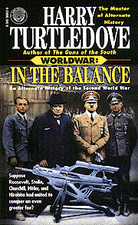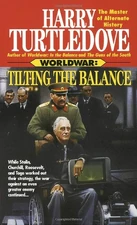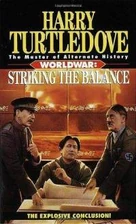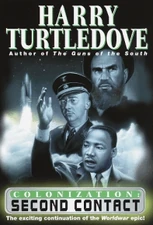| Joachim von Ribbentrop | |
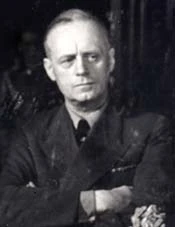
| |
| Historical Figure | |
| Nationality: | Germany (born in Prussia) |
| Year of Birth: | 1893 |
| Year of Death: | 1946 |
| Cause of Death: | Execution by hanging |
| Occupation: | Nobleman, Diplomat, Politician, Businessman |
| Spouse: | Anna Elisabeth Henkell |
| Children: | Five |
| Military Branch: | Imperial German Army (World War I), SS (World War II) |
| Political Party: | NSDAP |
| Political Office(s): | Legislator, German Foreign Minister |
| Fictional Appearances: | |
Ulrich Friedrich Wilhelm Joachim von Ribbentrop (30 April 1893 – 16 October 1946) was Foreign Minister of Nazi Germany from 1938 until 1945.
Ribbentrop first came to Adolf Hitler's notice as a well-travelled businessman with more knowledge of the outside world than most senior Nazis and as an authority on world affairs. He offered his house for the secret meetings in January 1933 that resulted in Hitler's appointment as Chancellor of Germany. He became a close confidant of Hitler, to the disgust of some party members, who thought him superficial and lacking in talent. He was appointed Ambassador to the United Kingdom in 1936, and then Foreign Minister of Germany in February 1938.
Before World War II, he played a key role in brokering the Pact of Steel (an alliance with Fascist Italy) and the Molotov-Ribbentrop Pact, both in 1939. He favored retaining good relations with the Soviet Union, and opposed the invasion of the USSR, which took place June 1941. In the autumn of 1941, due to American aid to Britain and the increasingly frequent "incidents" in the North Atlantic between U-boats and American warships guarding convoys to Britain, Ribbentrop worked for the failure of the Japanese-American talks in Washington, DC and for Japan to attack the United States. He did his utmost to support a declaration of war on the United States after the attack on Pearl Harbor.
Despite all this, from 1941 onwards, Ribbentrop's influence declined. Ribbentrop's found his jurisdiction as foreign minister increasingly at odds with other key parts of the government, including the SS. Moreover, the simple reality that Germany was at war with most of the world meant diplomacy decreased in value, and Ribbentrop's relevance fell accordingly. His influence further fell as he frequently begged Hitler to seek peace with Germany's enemies. When Hitler committed suicide, his will directed that Arthur Seyss-Inquart replace Ribbentrop as foreign minister.
Arrested in June 1945, Ribbentrop was tried at the Nuremberg Trials and convicted for his role in starting World War II in Europe and enabling the Holocaust. On 16 October 1946, he became the first of those sentenced to death by hanging to be executed.
Joachim von Ribbentrop in Worldwar[]
| Worldwar POD: May 30, 1942 | |
| Appearance(s): | In the Balance through Striking the Balance |
| Type of Appearance: | Direct |
| Date of Death: | 1950s |
| Cause of Death: | Unrevealed |
| Political Office(s): | German Ambassador to the Race |
In his capacity as foreign minister, Joachim von Ribbentrop represented Germany at the various Big Five meetings after the Race invaded in 1942.[1] During many meetings, Ribbentrop's shortcomings were evident, and he was a frequent victim of nettling at the hands of his Soviet counterpart, Vyacheslav Molotov.[2]
In 1943, Ribbentrop personally met with Molotov to share Adolf Hitler's proposal for the coordination of the use of explosive-metal bombs. While this meeting saw no formal agreement, Molotov did learn much about Germany's bomb program from Ribbentrop's indiscreet comments.[3]
In 1944, Ribbentrop appeared on his country's behalf at the Peace of Cairo,[4]where he ensured the Race's respect for the German claim to territory it had conquered prior to 1942 and the newly annexed Italy, as well as the survival of Romania, Slovakia, Hungary, Finland, Sweden, and Switzerland as independent not-empires.[5] Conflict emerged however, when Molotov pointed out that some of the territory German claimed had been Soviet territory.[6] When Molotov suggested that the Race remain in Poland,[7] Ribbentrop rejected the idea almost out of hand, on Hitler's directive.[8]
This intransigence on Hitler's part, as communicated by an intransigent Ribbentrop,[9] led to an ultimatum of ongoing war from Germany.[10] The ultimatum came despite Fleetlord Atvar's promise to level Germany if the Race were attacked again.[11] Ribbentrop issued what he thought was final declaration, made to the horror of the other human delegates, a few days later.[12]
Ribbentrop maintained this position until he publicly read a statement prepared for him by the German government to Atvar and the other delegates referring to an atomic explosion that marked the renewed war between Germany and the Race[13] Ribbentrop was referring to an attack on the Polish city of Lodz that was to be led by Otto Skorzeny.[14] However, that device was captured,[15] and Skorzeny ultimately killed.[16]
Thus, Atvar was able to inform Ribbentrop that there had been no explosion.[17] Later, Ribbentrop had no choice but to assume a more differential manner,[18] and, despite loud protests, accepted the Race's presence in Poland.[19]
After the fighting, Ribbentrop served as the Reich's ambassador to the Race for a time. He was eventually succeeded by Ludwig Bieberback.[20]
Joachim von Ribbentrop in The Man With the Iron Heart[]
| The Man With the Iron Heart POD: May 29, 1942; Relevant POD: May, 1945 | |
| Type of Appearance: | Contemporary reference |
Joachim von Ribbentrop was one of several German officials who was captured by the Allies at the end of World War II. The Allies sought to try Ribbentrop and the other men for war crimes. These plans were stopped thrice by the German Freedom Front: first in November 1945 when the GFF destroyed the Palace of Justice in Nuremberg;[21] second in 1946, when the GFF destroyed the American residency zone with a radium bomb[22], and; third, when agents of the GFF crashed a cargo plane into a Berlin courthouse in 1947.[23]
Joachim von Ribbentrop in The War That Came Early[]
| The War That Came Early POD: July 20, 1936; Relevant POD: September 29, 1938 | |
| Appearance(s): | Hitler's War |
| Type of Appearance: | Contemporary reference |
Joachim von Ribbentrop was the German Foreign Minister when the Second World War that began in October 1938. As part of his duties, he negotiated an alliance between Germany and Poland against the Soviet Union early in the war,[24] and had to placate the United States after the sinking the SS Athenia.[25] However, all final decisions rested with Adolf Hitler.[26]
Joachim von Ribbentrop in Joe Steele[]
| Joe Steele POD: 1878; Relevant POD: July, 1932 | |
| Novel or Story?: | Novel |
| Type of Appearance: | Contemporary reference |
Joachim von Ribbentrop was the German foreign minister in the period leading up to World War II. In the last week of August 1939, Soviet foreign commissar Maxim Litvinov flew to Berlin and signed a non-aggression treaty and trade package with Ribbentrop. Germany invaded Poland on 1 September 1939, and the Soviets joined in the invasion a few weeks later.[27]
References[]
- ↑ See, e.g., In the Balance, pg. 221, PB.
- ↑ , See, e.g. Ibid., pg. 228.
- ↑ Upsetting the Balance, pgs. 254-257.
- ↑ Striking the Balance, pg. 367, PB
- ↑ Ibid., pg. 375.
- ↑ Ibid.
- ↑ Ibid., pg. 376.
- ↑ Ibid.
- ↑ Ibid. pg. 398.
- ↑ Ibid., pg. 399.
- ↑ Ibid.
- ↑ Ibid., pg. 406.
- ↑ Ibid., pg. 422.
- ↑ Ibid., pg. 420.
- ↑ Ibid., pgs. 423.
- ↑ Ibid., pg. 485.
- ↑ Ibid., pg. 423.
- ↑ Ibid., pg. 438.
- ↑ Ibid. pg. 440.
- ↑ Down to Earth, pg. 291, PB.
- ↑ The Man With the Iron Heart, pg. 108.
- ↑ Ibid., pg. 260.
- ↑ Ibid., pg. 407-8.
- ↑ Hitler's War, pg. 200, HC.
- ↑ Ibid. pg. 323.
- ↑ See, e.g., ibid., pg. 389.
- ↑ Joe Steele, pg. 209-215, HC.
| Political offices (OTL) | ||
|---|---|---|
| Preceded by Konstantin von Neurath |
Foreign Minister of Germany 1938–1945 |
Succeeded by Arthur Seyss-Inquart |
| Political offices (Worldwar) | ||
| Preceded by Konstantin von Neurath |
Foreign Minister of Germany 1938-195? |
Succeeded by Unknown |
| |||||||||||||||||||
| |||||||||||||||||
| ||||||||||||||||||||||
| |||||||||||||||||||||||||








